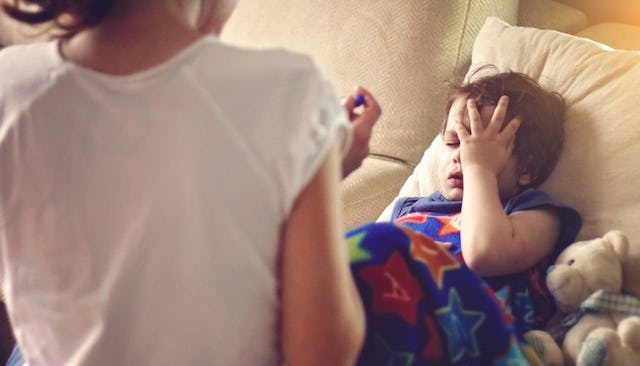It Turns Out Mono May Mean More Than Just A Teenage 'Kissing Disease'

When I was a sophomore in high school, our chorus’s entire soprano section and a third of the tenor section was out sick for a month. We nearly missed our holiday concert thanks to what everyone was calling “the kissing disease.” I remember wondering to myself if all those kids swapped saliva, and every practice after that felt awkward. I was totally skeeved out.
Turns out those kids has mononucleosis, or “mono” for short, which is a virus that leaves the infected person feeling tired, so tired in fact that a person sick with it typically misses three weeks or more of work or school. What causes mono? Well, this is where things get a bit freaky.
Remember how we all freaked out when we learned that having had chicken pox as a kid could put you at risk for shingles as an adult? Well, it looks like “the kissing disease” can also be connected to other health issues as well. Mononucleosis is caused by the Epstein-Barr virus (EBV), which in medical circles is known as human herpesvirus 4 and is caused by swapping saliva with an infected person. That spit-swap could occur from something as simple of sharing a cup or a fork or — if you’re one of those couples — sharing a toothbrush. It’s not only transmitted through juvenile make-out sessions, surprisingly enough.
The virus is so easily spread that 95% of adults are infected with it. And the virus, when it does cause symptoms, can be challenging to diagnose. The symptoms that arise are easy to write off as something else, and typically each person experiences a random assortment of the classic telltale signs before being diagnosed. Symptoms such as general fatigue, body pain, fever, rash, sore throat, headaches, joint pain, and ringing in the ears oftentimes result in patients being misdiagnosed as having the flu or a flu-like virus.
Like chicken pox turning into chronic shingles, EBV can turn into chronic mono, which is terrifying when you consider that the number one symptom is extreme fatigue. Researchers are beginning to believe that chronic mono is also one more cause of fibromyalgia, several known cancers such as Hodgkin’s lymphoma and certain immunodeficiencies. Researchers have also found that patients who suffer from multiple sclerosis also have significantly high rates of EBV in their systems.
So, what should you do when you know that most of the adult population has EBV in their bodies? I mean, sure, you can freak out, but that literally helps nothing. Instead, the CDC recommends using common sense safety precautions. Since there is no vaccine available to prevent this virus from entering your system, the only thing you can do is refrain from swapping spit as much as possible (easier said than done in a houseful of kids, I know). If you suspect that you have mono-like symptoms, see your doctor right away, of course.
Currently, researchers are trying to create an effective vaccine for Epstein-Barr virus, particularly as a way to prevent several cancers. However, at the time of this article, no vaccines have made it past testing phases or are expected to hit the markets in the near future. You can call your representative and request that more attention and funding be given toward finding an effective vaccine to prevent EBV.
I am not meaning for this to be all doom and gloom and give us something else to stress the hell out over, but information is essential. I literally had no idea that having mono had any health risks outside of the typical virus running its course over a few weeks while making its patient far more tired than normal. I have a feeling I’m not the only one.
This article was originally published on